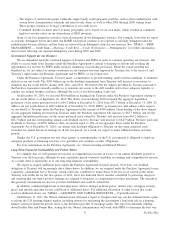Freddie Mac 2010 Annual Report Download - page 20
Download and view the complete annual report
Please find page 20 of the 2010 Freddie Mac annual report below. You can navigate through the pages in the report by either clicking on the pages listed below, or by using the keyword search tool below to find specific information within the annual report.
For information about the amount of mortgage-related securities we have issued, see “Table 34 — Freddie Mac
Mortgage-Related Securities.” For information about the relative performance of mortgages underlying these securities, refer
to our “MD&A — RISK MANAGEMENT — Credit Risk” section.
PC Trust Documents
We establish trusts for all of our issued PCs pursuant to our PC master trust agreement. In accordance with the terms of
our PC trust documents, we have the option, and in some instances the requirement, to purchase specified mortgage loans
from the trust. We purchase these mortgages at an amount equal to the current UPB, less any outstanding advances of
principal on the mortgage that have been distributed to PC holders. From time to time, we reevaluate our delinquent loan
purchase practices and alter them if circumstances warrant. Our practice is to purchase mortgages that are 120 days or more
delinquent from pools underlying our PCs when:
• the mortgages have been modified;
• foreclosure sales occur;
• the mortgages are delinquent for 24 months; or
• the cost of guarantee payments to PC holders, including advances of interest at the PC coupon rate, exceeds the
expected cost of holding the nonperforming loans.
On February 10, 2010, we announced that we would purchase substantially all single-family mortgage loans that are
120 days or more delinquent underlying our issued PCs. This change in practice was made based on a determination that the
cost of guarantee payments to the security holders will exceed the cost of holding unsecuritized non-performing loans on our
consolidated balance sheets. The cost of holding unsecuritized non-performing loans on our consolidated balance sheets was
significantly affected by our January 1, 2010 adoption of amendments to certain accounting standards and changing
economics pursuant to which the recognized cost of purchasing most delinquent loans from PC trusts was less than the
recognized cost of continued guarantee payments to security holders. See “Executive Summary — Changes in Accounting
Standards Related to Accounting for Transfers of Financial Assets and Consolidation of VIEs” for additional information.
In accordance with the terms of our PC trust documents, we are required to purchase a mortgage loan (or, in some
cases, substitute a comparable mortgage loan) from a PC trust in the following situations:
• if a court of competent jurisdiction or a federal government agency, duly authorized to oversee or regulate our
mortgage purchase business, determines that our purchase of the mortgage was unauthorized and a cure is not
practicable without unreasonable effort or expense, or if such a court or government agency requires us to repurchase
the mortgage;
• if a borrower exercises its option to convert the interest rate from an adjustable-rate to a fixed-rate on a convertible
ARM; and
• in the case of balloon-reset loans, shortly before the mortgage reaches its scheduled balloon-reset date.
The To Be Announced Market
Because our fixed-rate PCs are homogeneous, issued in high volume and highly liquid, they trade on a “generic” basis
by PC coupon rate, also referred to as trading in the TBA market. A TBA trade in Freddie Mac securities represents a
contract for the purchase or sale of PCs to be delivered at a future date; however, the specific PCs that will be delivered to
fulfill the trade obligation, and thus the specific characteristics of the mortgages underlying those PCs, are not known (i.e.,
“announced”) at the time of the trade, but only shortly before the trade is settled. The use of the TBA market increases the
liquidity of mortgage investments and improves the distribution of investment capital available for residential mortgage
financing, thereby helping us to accomplish our statutory mission. The Securities Industry and Financial Markets Association
publishes guidelines pertaining to the types of mortgages that are eligible for TBA trades.
Underwriting Requirements and Quality Control Standards
We use a process of delegated underwriting for the single-family mortgages we purchase or securitize. In this process,
our contracts with seller/servicers describe mortgage underwriting standards and the seller/servicers represent and warrant to
us that the mortgages sold to us meet these standards. In our contracts with individual seller/servicers, we sometimes waive
or modify selected underwriting standards. Through our delegated underwriting process, mortgage loans and the borrowers’
ability to repay the loans are evaluated using several critical risk characteristics, including but not limited to, the borrower’s
credit score and credit history, the borrower’s monthly income relative to debt payments, the original LTV ratio, the type of
mortgage product and the occupancy type of the loan. We subsequently review a sample of these loans and, if we determine
that any loan is not in compliance with our contractual standards, we may require the seller/servicer to repurchase that
mortgage. In lieu of a repurchase, we may agree to allow a seller/servicer to indemnify us against loss in the event of a
default by the borrower or enter into some other remedy. During the year ended December 31, 2010, we reviewed a
17 Freddie Mac
























